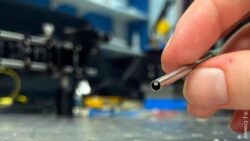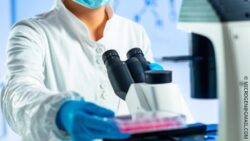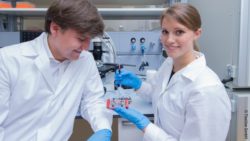
Fraunhofer IGB
Fraunhofer enables early pancreatic cancer screening
08.08.2025
Fraunhofer researchers develop a blood test for early detection of pancreatic cancer, using methylation analysis of circulating tumor DNA.
Hahn-Schickard
Blood test detects colorectal cancer with high accuracy
11.07.2025
Researchers at Hahn-Schickard analyze blood samples using a dual-method approach to improve early detection of colorectal cancer.
Personalized cancer treatment: mini-tumors and digital twins
06.03.2025
The “ISPOT-K” project is working on an approach for personalized cancer therapy based on organoids and digital twins.
Thomas Dennison/University of Cambridge
Lab-grown 'mini-guts' for Crohn’s disease treatments
06.09.2024
University of Cambridge creates lab-grown mini-guts to study Crohn’s disease - offering insights for personalized, effective treatments.
Gastrointestinal diagnostics: The Sonopill and AutoCapsule projects
29.08.2024
Capsule endoscopy has revolutionized gastrointestinal tract diagnosis over the past decade. The Sonopill program, led by Professors Marc Desmulliez and Sandy Cochran, is at the forefront of integrating ultrasound imaging and therapy into capsule technology.
Identifying a biomarker for gastric cancer recurrence risk
16.08.2024
MedUni Vienna study identifies AF1Q gene as key biomarker for gastric cancer relapse - enabling more personalized treatment.
Khan Lab at USC Viterbi School of Engineering
Smart pills with AI for health monitoring
09.08.2024
USC Viterbi researchers create AI-powered ingestible sensors for real-time 3D GI monitoring - enabling early disease detection via smart pills.
Plasmids in the human intestine
27.05.2024
University of Oldenburg-led study finds gut plasmid as potential biomarker for detecting fecal contamination and monitoring IBD.
Gerard Cummins, University of Birmingham
Swallowable sensors for health monitoring
03.05.2024
Heriot-Watt, Birmingham & Edinburgh researchers develop ingestible capsule with sensors to track gut movement.
Prototype applies AI to advance colorectal diagnosis
15.03.2024
Portuguese researchers from the Institute for Systems and Computer Engineering, Technology and Science (INESC TEC) and the IMP Diagnostics Molecular & Anatomic Pathology laboratory have unveiled the world's first prototype applying Artificial Intelligence (AI) to colorectal diagnosis.
J. Crowley
Imaging device for early gastrointestinal cancer detection
01.03.2024
Gastrointestinal cancers (GCs) pose a significant health challenge worldwide, with early detection being crucial for effective treatment and improved survival rates. To address this need, scientists have developed a new imaging device aimed at enhancing the accuracy and accessibility of GC screening programs.
umg/Dr. Dolma Choezom
Project CANACO: better imaging-based and targeted therapy of colon cancer
01.11.2023
The University Medical Center Göttingen (UMG) is coordinating the development of a new nanoparticle-based method for the personalized therapy of patients suffering from colon cancer.
Karin Kaiser / MHH
How harmless turns dangerous
24.08.2023
MHH researcher Prof. Galardini from the RESIST Cluster of Excellence finds causes for bloodstream infections in the genes of bacteria. This will enable better diagnostics and vaccinations in the future.
EKFZ
AI against bowel cancer: research project DECADE
12.07.2023
The DECADE research project is the first to use swarm learning in cancer research. The German Cancer Aid is funding the joint project of several university hospitals with around 1.5 million euros.
Natabuena
Functional imaging: intestinal and liver diseases mutually influence each other
06.07.2023
The research groups of Prof. Trautwein (University Hospital RWTH Aachen) and Prof. Hengstler (Leibniz Research Centre for Working Environment and Human Factors in Dortmund) have made a surprising discovery about the interaction of the liver and the intestine.
Empa
Sensor patch for abdominal surgery
23.06.2023
Empa and ETH Zurich researchers develop sensor-equipped plaster to monitor and ensure post-op abdominal wounds stay securely closed.
Anna Schroll/Leibniz-HKI
Model shows intestinal bacteria influence growth of fungi
22.05.2023
The bacteria present in the intestine provide information about the quantities of fungi of the potentially disease-causing Candida genus.
SciePro/Shutterstock
Morbus Crohn: new imaging technique for effective therapy
12.04.2023
An interdisciplinary research group at MedUni Vienna has investigated a new imaging technique that can improve the treatment of intestinal strictures from Morbus Crohn.
Eurice Office
Personalised health blueprint to prevent and predict inflammatory bowel disease
07.03.2023
Project led by PMI member Prof. Andre Franke aims to empower people affected by Crohn’s disease and ulcerative colitis by developing interdisciplinary solutions for improved disease prevention and health promotion.
RUB, Marquard
AI with infrared imaging enables precise colon cancer diagnostics
23.02.2023
Researchers at the Centre for Protein Diagnostics PRODI at Ruhr University Bochum, Germany, are using artificial intelligence in combination with infrared imaging to optimally tailor colon cancer therapy to individual patients.
Osaka Metropolitan University
Realtime monitoring with wearable reveals IBS-related changes
18.01.2023
Associate Professor Fumio Tanaka and his research group at the Osaka Metropolitan University Graduate School of Medicine recorded the autonomic nervous system activity of IBS patients and healthy subjects using a wearable device and tracked activities such as defecation and sleep.
Universitätsklinikum Bonn (UKB)
AI improves colorectal cancer screening in Lynch syndrome
10.01.2023
Researchers at the National Center for Hereditary Tumor Diseases (NZET) at Bonn University Hospital (UKB) have now found that artificial intelligence (AI) can improve the effectiveness of colonoscopy in the presence of Lynch syndrome.
MICROGEN@GMAIL.COM
Molecular markers: predicting the most effective treatment for IBD
09.08.2022
Early effective treatment can help manage this condition and improve the quality of life of patients. A research project aims to identify molecular markers to better assess the chances of success of certain biological therapies and subsequently determine the best individualized treatment plan.
Multi-Organ Chips – The Patients of Tomorrow?
01.02.2019
The liver, nervous tissue or the intestines: all are important human organs that have in the past been tested for their function and compatibility using animal or in vitro test methods. In recent years, TissUse GmbH, a spin-off of the Technical University of Berlin (TU Berlin), has launched multi-organ chip platforms. But that’s not all.